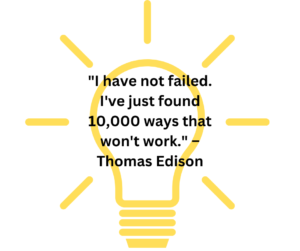“I have not failed. I've just found 10,000 ways that won't work.” – Thomas Edison: Embracing Failure and Perseverance for Business Success
This timeless quote by prolific inventor Thomas Edison underscores the significance of failure as an invaluable step in the journey toward success. In the dynamic world of business, where innovation and risk-taking are paramount, understanding how to navigate setbacks is essential to both personal and organizational growth.
The Power of a Growth Mindset
Edison's quote encapsulates the essence of a growth mindset – embracing challenges and mistakes as opportunities for learning and improvement. This perspective is particularly important in the rapidly evolving business landscape. Those who view failures as permanent roadblocks often get discouraged, leading to stagnation and limited success. On the other hand, those who adopt a growth mindset understand that every setback is a chance to refine their approach, adapt to changing circumstances, and ultimately discover solutions that work.
Resilience as a Competitive Advantage
In business, resilience is a defining factor that separates those who rise above challenges from those who falter. The ability to bounce back from failure, reevaluate strategies, and persist with renewed determination is often the hallmark of successful entrepreneurs and organizations. This tenacity is driven by an understanding that setbacks are an inevitable part of the process and that overcoming them leads to the accumulation of valuable insights and experience.
The Innovation Imperative
Innovation is at the heart of many successful businesses. However, innovation is intrinsically entwined with experimentation – and some experiments will inevitably fail to produce the desired outcome. Businesses that foster a culture of calculated risk-taking are often better positioned to generate cutting-edge products and services. This requires acceptance of “failure” as a stepping stone towards refining ideas and uncovering breakthrough concepts.
Iterative Learning
Thomas Edison's iterative approach to inventing the light bulb is a classic example of the power of perseverance and continuous improvement. Rather than becoming discouraged by failures, he systematically analyzed results, identified areas for improvement, and relentlessly pursued his goal. This same iterative approach is valuable in many business contexts. Whether it's refining marketing strategies, improving production processes, or developing new product features, adopting an iterative mindset can lead to significant breakthroughs.
Embracing the Data
Successful businesses often utilize data extensively to make informed decisions. Analyzing past failures can offer valuable insights and help leaders make more informed decisions in the future. By tracking what didn't work, businesses can understand patterns, pinpoint areas for process improvement, and develop strategies to mitigate the risk of future setbacks.
Practical Applications of the Edison Quote
How can businesses apply the wisdom of Edison's quote to achieve greater success? Consider these strategies:
-
Foster a safe environment for failure: Create a workplace culture where employees feel comfortable taking calculated risks and experimenting with new ideas. This may involve celebrating learning derived from “flops” as much as celebrating successes. Let employees share what they learned from failed experiments to benefit the organization as a whole.
-
Prioritize learning and development: Offer opportunities for employees to enhance their skills and knowledge continuously. Encourage participation in workshops, conferences, and mentorship programs.
-
Reward perseverance and resilience: Recognize and reward employees who demonstrate tenacity when challenges arise. Emphasize a growth mindset over a fear-driven performance review process.
-
Data-driven decision-making: Track failures and successes meticulously. Analyze data to understand trends, identify weaknesses, and make informed changes to improve practices.
-
Celebrate progress, not just success: Acknowledge milestones along the path to a major goal and celebrate the incremental wins along the way. Even if the end goal proves elusive, the learning and growth process itself is worthy of recognition.
The Paradox of Failure and Success in the Thomas Edison Quote
While the Thomas Edison quote emphasizes failure, it ultimately speaks to the value of determination and the potential for success. Failure and success are inextricably linked. Embracing failure provides a foundation for future success and cultivates the resilience necessary to prevail in a competitive and ever-changing business climate.
Businesses that adopt a growth mindset, celebrate resilience, and prioritize learning are better equipped to transform inevitable setbacks into stepping stones toward achieving their goals and long-term success. Just as Edison's persistence ultimately resulted in a groundbreaking invention, businesses that learn to work with their failures and not against them are poised to carve their path to innovation and breakthroughs.
FAQ
Q: My team is afraid of failure. How can I change this mindset? A: Start by shifting the language around failure. Instead of “failure,” emphasize “learning opportunities” or “iterations.” Share stories of successful innovators who overcame setbacks, including Thomas Edison himself. Reward efforts that demonstrate risk-taking and resilience, even if they don't result in immediate success.
Q: How can we practically extract valuable lessons from failures? A: Implement a system for documenting failures. Encourage team members to analyze what went wrong, identifying areas for improvement without assigning blame. Turn these insights into actionable changes for future projects.
Q: Is there a point where perseverance becomes counterproductive? A: Yes. It's essential to strike a balance between persistence and knowing when to pivot. Data-driven decision-making is crucial; analyze your results and be willing to adjust strategies when the evidence suggests it's necessary.
Q: How can I, as a leader, model a healthy attitude towards failure? A: Be open about your own past learning experiences. Publicly acknowledge when you've made a mistake and explain how you've adapted as a result. This creates a culture of transparency and psychological safety around failure.
Q: Are there specific industries where this quote is particularly relevant? A: Thomas Edison's quote applies to every industry, but it's especially significant for innovation-driven sectors like technology, research and development, and any business that prioritizes experimentation to uncover breakthroughs.



















